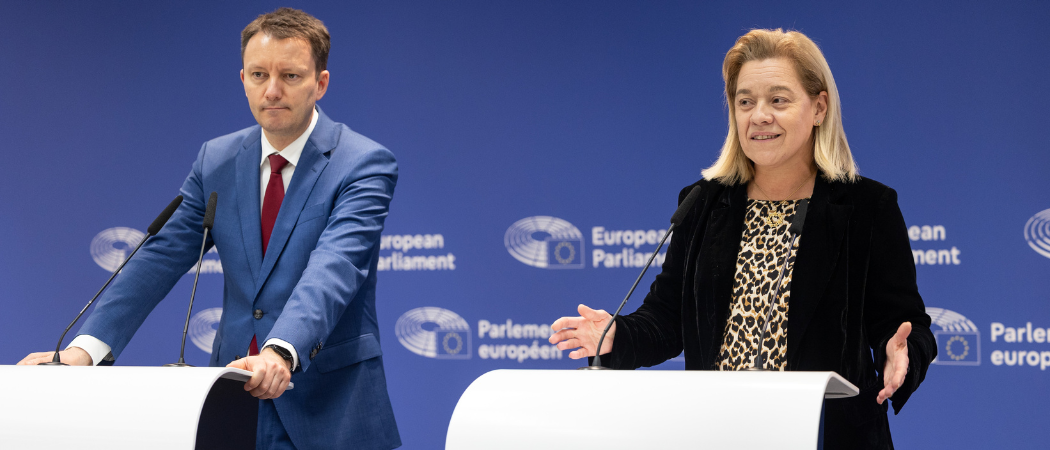Budget committee says the proposed Competitiveness Fund is “not fit for purpose” and demands a dedicated innovation funding for researchers

Siegfried Mureşan and Carla Tavares, co-rapporteurs of the BUDG report. Photo credits: European Union
The European Parliament’s budget committee has declared the proposed European Competitiveness Fund “inadequate” and “not fit for purpose” in a report on the EU’s next Multiannual Financial Framework (MFF). It also called for the creation of a standalone research Framework Programme after 2028.
The own-initiative report was approved by the committee on April 23, by 23 votes to nine, with two abstentions. It will now be debated in the Parliament’s plenary session on May 7.
Speculation has been growing since September that instead of a standalone programme to succeed Horizon Europe in 2028, research and innovation funding would be absorbed into a broader European Competitiveness Fund. Although the research commissioner, Ekaterina Zaharieva, said earlier this month that there can be both a standalone FP10 and a Competitiveness Fund, the absence of FP10 from the European Commission’s Competitiveness Compass strategy has only fuelled such fears.
“The European Parliament fully supports a dedicated research programme in the new MFF,” Siegfried Mureşan, the European People’s Party (EPP) MEP who co-wrote the report, told Science|Business. “Researchers should not have to compete with businesses for EU funds if we want to drive innovation.”
While the draft of the report initially made no explicit call for a standalone FP10, an amendment submitted by Christian Ehler and Niclas Herbst (both EPP) stated that Parliament should "absolutely oppose any proposal for the Competitiveness Fund to partly or completely take over the role" of FP10.
This amendment was ultimately included in the adopted report in a more moderate form. The final text (which has yet to be published) recalls that, under the EU treaties, the Union is required to adopt a Framework Programme for research. Instead of endorsing a Competitiveness Fund, the report calls for a targeted instrument designed to leverage both public and private investment through EU-backed de-risking mechanisms, building on successful models such as InvestEU.
Mureşan told Science|Business that InvestEU has proven effective in mobilising and leveraging private investment, with approved operations expected to generate around €218 billion in additional funding, including approximately €141 billion from private sources.
Related articles:
- MEPs press budget committee to join the fight for FP10
- Parliament set for showdown with Commission over standalone FP10
“The Parliament is very clear that a Competitiveness Fund should not be a merger of existing programmes, especially the highly successful ones, but an entirely new instrument that would complement the already existing programmes,” said Carla Tavares (Socialists and Democrats), co-rapporteur of the report with Mureşan.
The budget committee report also calls for increased investment in security and defence, in particular highlighting the importance of dual-use technologies that would “contribute to the Union’s defence capabilities.”
The Commission’s position on dual use is already evolving. A draft regulation published on April 22 would allow the European Innovation Council to fund dual-use technologies, marking a significant shift from its exclusively civilian mandate.
Pushing back
The Parliament recently took a firm stance on the independence of FP10 in a plenary vote on a report presented by the research and industry committee. The budget committee report now adds further momentum to that that position, even if neither report is binding on the Commission or the EU Council.
Ehler, who authored the research committee report, welcomed the result in the budget committee. “I wish the report had been voted months ago so that the Commission could have worked with the Parliament, member states and stakeholders on a productive vision for a European Competitiveness Fund,” he told Science|Business. “This is a missed opportunity for the Parliament, because now we will need to fix problems during the legislative procedure, and that usually becomes rather complex.”
Mureşan also signalled the Parliament’s determination to continue pushing back against the Commission’s plans. “We are prepared to defend this position and play a key role in negotiations on the post-2027 EU budget,” he told Science|Business. “While we seek timely adoption, we will not support a budget that fails to meet citizens’ needs or disregards Parliament’s legislative, budgetary, and oversight roles.”





 A unique international forum for public research organisations and companies to connect their external engagement with strategic interests around their R&D system.
A unique international forum for public research organisations and companies to connect their external engagement with strategic interests around their R&D system.